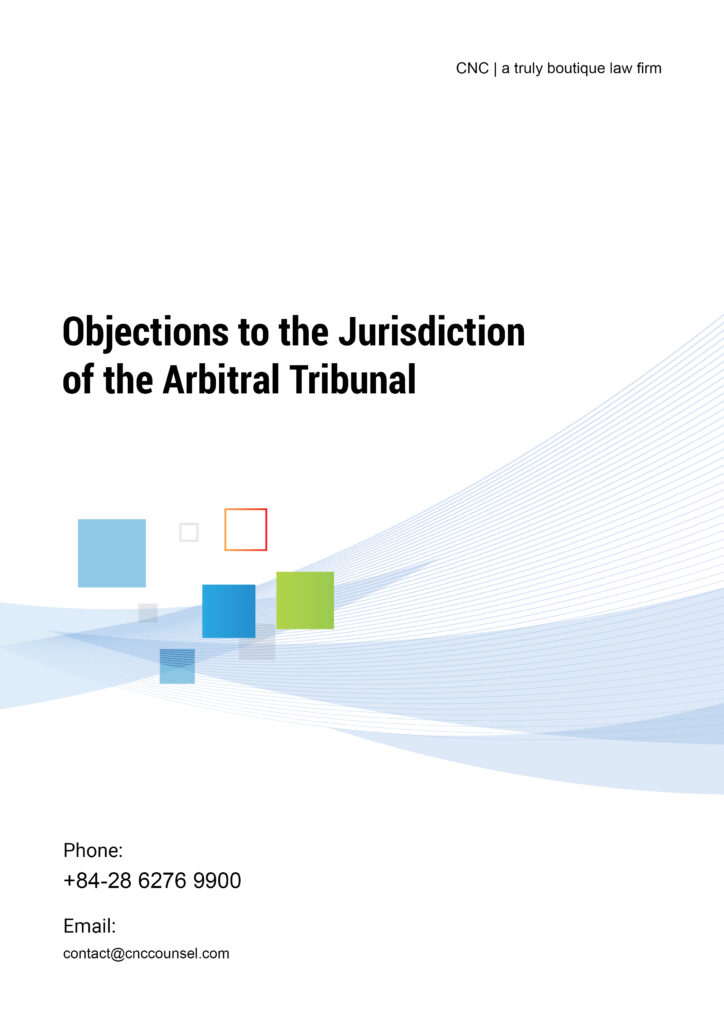Objections to the Jurisdiction of the Arbitral Tribunal
In arbitration proceedings, the arbitral tribunal plays a central role, directly influencing the quality and efficiency of dispute resolution. However, the tribunal’s jurisdiction is not always recognized or accepted. In practice, objections to the tribunal’s jurisdiction often arise when one party believes that the tribunal lacks the legal basis to resolve the dispute.
Challenging the tribunal’s jurisdiction not only helps the parties protect their legal rights and interests but also ensures the proper application of legal provisions throughout the dispute resolution process. In this article, CNC will provide essential information regarding objections to the jurisdiction of the arbitral tribunal.
Download PDF file here
Overview of Objections to the Jurisdiction of the Arbitral Tribunal
An objection to the jurisdiction of the arbitral tribunal is a legal measure that a disputing party may adopt to protect its legitimate rights and interests if it believes that the tribunal does not meet the legal requirements necessary to exercise jurisdiction over the dispute. In arbitration proceedings, if a party disagrees with the tribunal’s jurisdiction, it can raise an objection and request clarification on whether the tribunal has the authority to adjudicate the case. For example, a party may challenge the validity or enforceability of the arbitration agreement.
In Vietnam, objections to jurisdiction are regulated under the 2010 Law on Commercial Arbitration and Resolution No. 01/2014/NQ-HĐTP, which provides guidance on the implementation of certain provisions of the arbitration law[1]. On an international level, objections to the jurisdiction of arbitral tribunals are also addressed in various legal frameworks governing commercial arbitration, most notably the UNCITRAL Model Law on International Commercial Arbitration[2].
Additionally, the principle of “competence-competence” plays a significant role in jurisdictional objections. This principle allows the arbitral tribunal to determine its own jurisdiction by examining the existence and validity of the arbitration agreement[3]. However, this authority is not absolute, meaning that parties still retain the right to challenge the tribunal’s jurisdiction.
Jurisdictional objections not only serve as a mechanism to verify the tribunal’s authority but also ensure that dispute resolution procedures comply with legal regulations. This is an essential safeguard against tribunals exceeding their jurisdiction or conducting proceedings in an improper manner. Consequently, raising an objection to the jurisdiction of the arbitral tribunal can assist in:
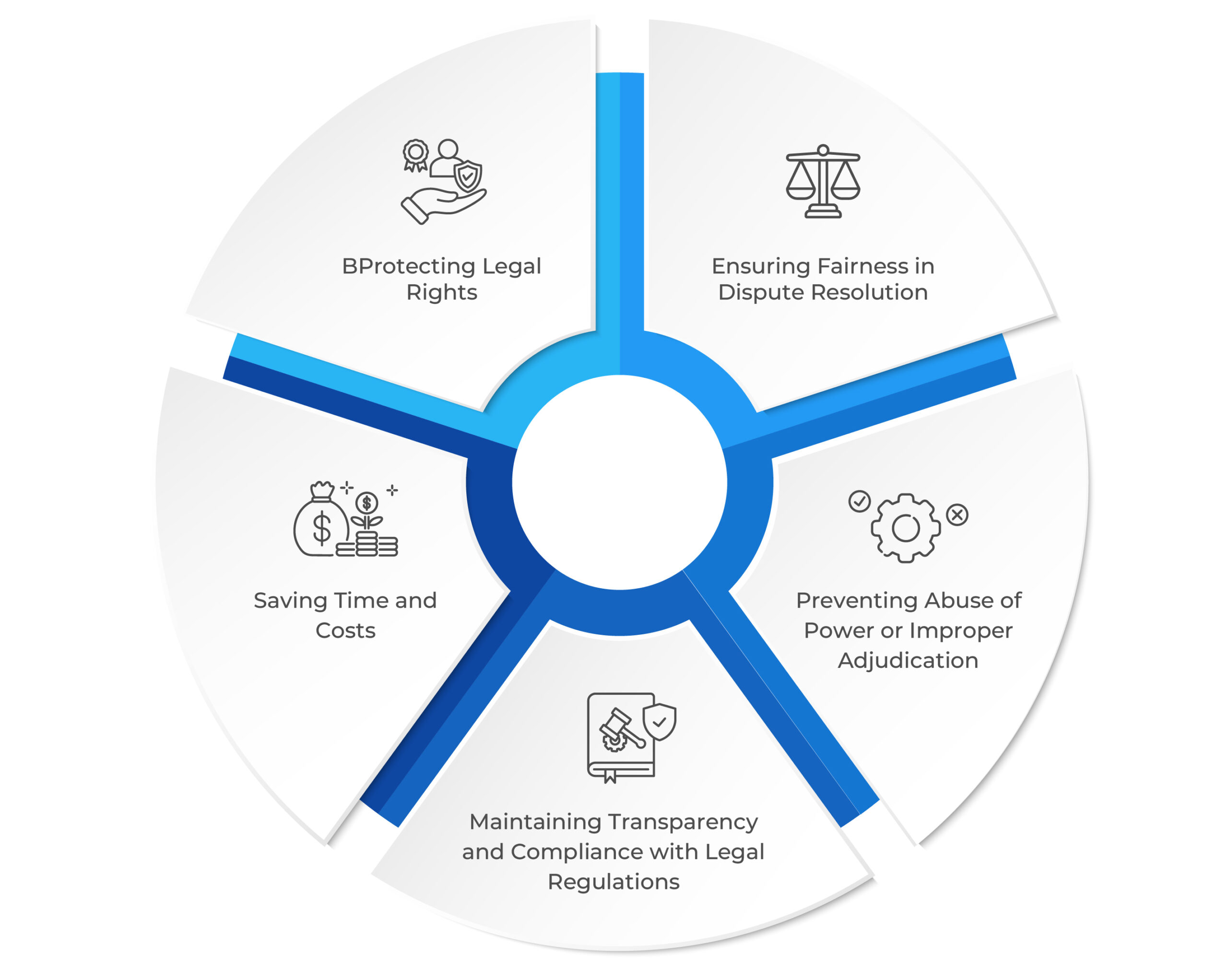
Protecting Legal Rights: Objecting to jurisdiction allows a disputing party to safeguard its rights if it believes the dispute falls outside the scope of the arbitration agreement. This prevents the risk of being bound by an inappropriate or ultra vires arbitral award.
Ensuring Fairness in Dispute Resolution: This measure compels the arbitral tribunal to carefully examine its jurisdiction before proceeding with the case, thereby reducing the risk of bias in the arbitration process.
Preventing Abuse of Power or Improper Proceedings: Timely objections to jurisdiction help parties prevent the tribunal from considering and ruling on matters beyond its authority.
Maintaining Transparency and Legal Compliance: Raising a jurisdictional objection requires the arbitral tribunal to establish the legitimacy of its authority before conducting any proceedings. This ensures that the arbitration process adheres to the law and in accordance with the arbitration agreement between the parties.
Saving Time and Costs: If a dispute does not fall under the tribunal’s jurisdiction, raising an objection prevents wasted time and expenses on an invalid arbitration process. Instead, the dispute can be resolved by the appropriate adjudicatory authority.
Grounds for Objections to the Jurisdiction of the Arbitral Tribunal
In practice, there are various reasons why disputing parties may challenge the jurisdiction of the arbitral tribunal. In Vietnam, objections to the tribunal’s jurisdiction are governed by Article 35.4 and Article 43.1 of the Law on Commercial Arbitration. Accordingly, if a party identifies a violation of this law or the arbitration agreement, it has the right to raise an objection before the arbitral tribunal.
Therefore, the parties may raise an objection to the jurisdiction of the arbitral tribunal if there are clear grounds indicating that the tribunal is adjudicating beyond its authority. These grounds may be based on the parties’ arbitration agreement or violations of the Law on Commercial Arbitration, particularly provisions related to arbitral jurisdiction and the tribunal’s authority. The main grounds for objecting to the jurisdiction of the arbitral tribunal can be summarized as follows:
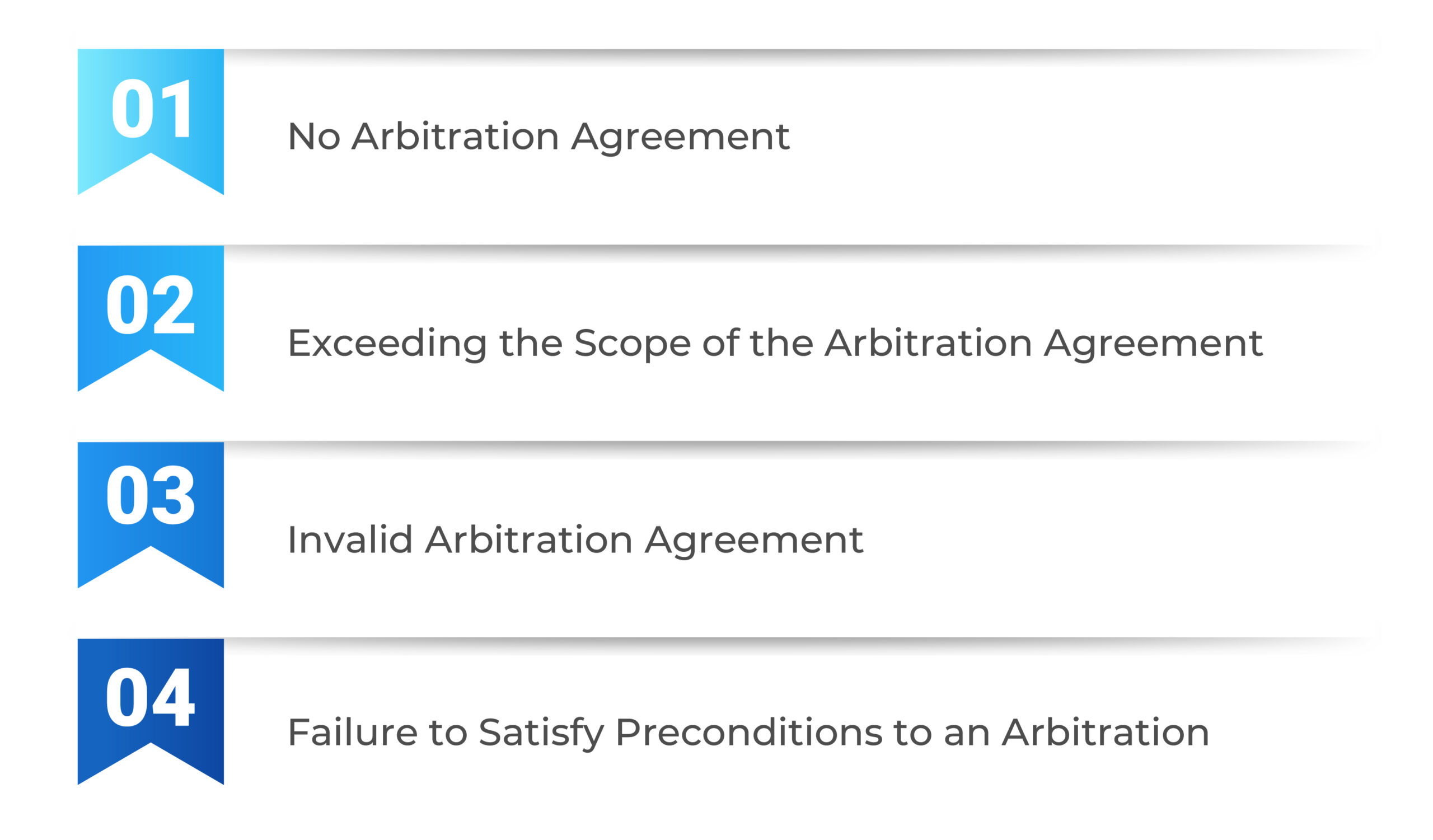
Grounds for Objections to the Jurisdiction of the Arbitral Tribunal
The first ground is the absence of an arbitration agreement. An arbitration agreement must be in writing, either as a separate contract or as an arbitration clause within a main contract. It may also be expressed through other means, such as correspondence, electronic communications, or other clearly documented forms[4].
If the arbitration agreement is not properly established in accordance with legal requirements or does not clearly demonstrate the mutual consent of the parties, it will be considered invalid and have no legal effect. In such cases, the parties have the right to challenge the jurisdiction of the arbitral tribunal, as there is no legal basis for the tribunal to resolve the dispute.
The second ground is exceeding the scope of the arbitration agreement. The parties’ agreement is a prerequisite for the arbitral tribunal’s jurisdiction[5]. Therefore, one of the fundamental principles of arbitration is that the tribunal can only resolve disputes that fall within the scope of the arbitration agreement.
If a dispute arises outside the agreed terms or exceeds the defined scope, the arbitral tribunal will lack jurisdiction. This may occur when the parties fail to clearly define the scope of their arbitration agreement or when the dispute arises from an issue not contemplated in the agreement.
For example, in a case where a court reviewed the recognition and enforcement of an award issued by the Swiss International Arbitration Center, the court found that the arbitral tribunal, in resolving the dispute, not only addressed the steel sales contract but also considered matters related to the letter of credit (L/C) for the contract. The court ruled that the tribunal lacked jurisdiction over L/C-related issues, stating that: “The request by Starglobe for the arbitral tribunal to order Tiến Lên Company to compensate for the unpaid L/C by Saigon Dong Nai Commercial Joint Stock Bank does not fall within the tribunal’s jurisdiction. By accepting and ruling on on the counterclaim related to Starglobe’s L/C payment issue, the sole arbitrator exceeded his authority.”[6]
Thus, if a party believes that the arbitral tribunal has exceeded its jurisdiction during the dispute resolution process, it may object to the portion that goes beyond the agreed scope and request that the tribunal adhere to its defined jurisdiction.
The third ground is the invalidity of the arbitration agreement. Under the 2010 Law on Commercial Arbitration, an arbitration agreement is legally effective only if it meets all the required legal conditions[7]. At the same time, the law also specifies cases in which an arbitration agreement is deemed invalid[8]. For instance, if one of the parties signed the arbitration agreement under coercion, fraud, or lacked legal capacity, the agreement will have no legal effect.
Additionally, an arbitration agreement is considered invalid if it violates prohibitions of the law, contradicts social ethics, or concerns disputes that fall outside the jurisdiction of arbitration.
Under current legal regulations, only certain types of disputes are eligible for resolution through arbitration[9], including:

Thus, arbitration is only permitted to resolve disputes that fall within its jurisdiction. If an arbitral tribunal accepts cases related to family law or bankruptcy, it would be in violation of arbitration jurisdiction regulations. Consequently, disputing parties have the right to challenge the tribunal’s jurisdiction to ensure that arbitration institutions comply with legal provisions on jurisdiction.
In summary, if an arbitration agreement is deemed invalid, the parties have the right to object to the jurisdiction of the arbitral tribunal. If it is proven that the agreement is invalid, the tribunal must cease proceedings and cannot continue resolving the dispute.
The fourth ground is failure to satisfy preconditions to arbitration. Dispute resolution clauses often include provisions requiring parties to engage in alternative dispute resolution (ADR) methods, such as negotiation and/or mediation, as a precondition to initiate arbitration or litigation[10].
Since these preconditions are mandatory under the parties’ agreement, if they have not been fulfilled before one party refers the dispute to arbitration, the other party may object to the tribunal’s jurisdiction. This ensures the integrity of the original agreement and guarantees that the agreed-upon dispute resolution steps are fully complied.
However, it is important to note that Vietnamese arbitration law currently does not provide specific regulations on whether pre-arbitration procedures must be strictly followed. Nonetheless, court rulings suggest that such violations are generally considered issues of admissibility rather than jurisdiction. Specifically:
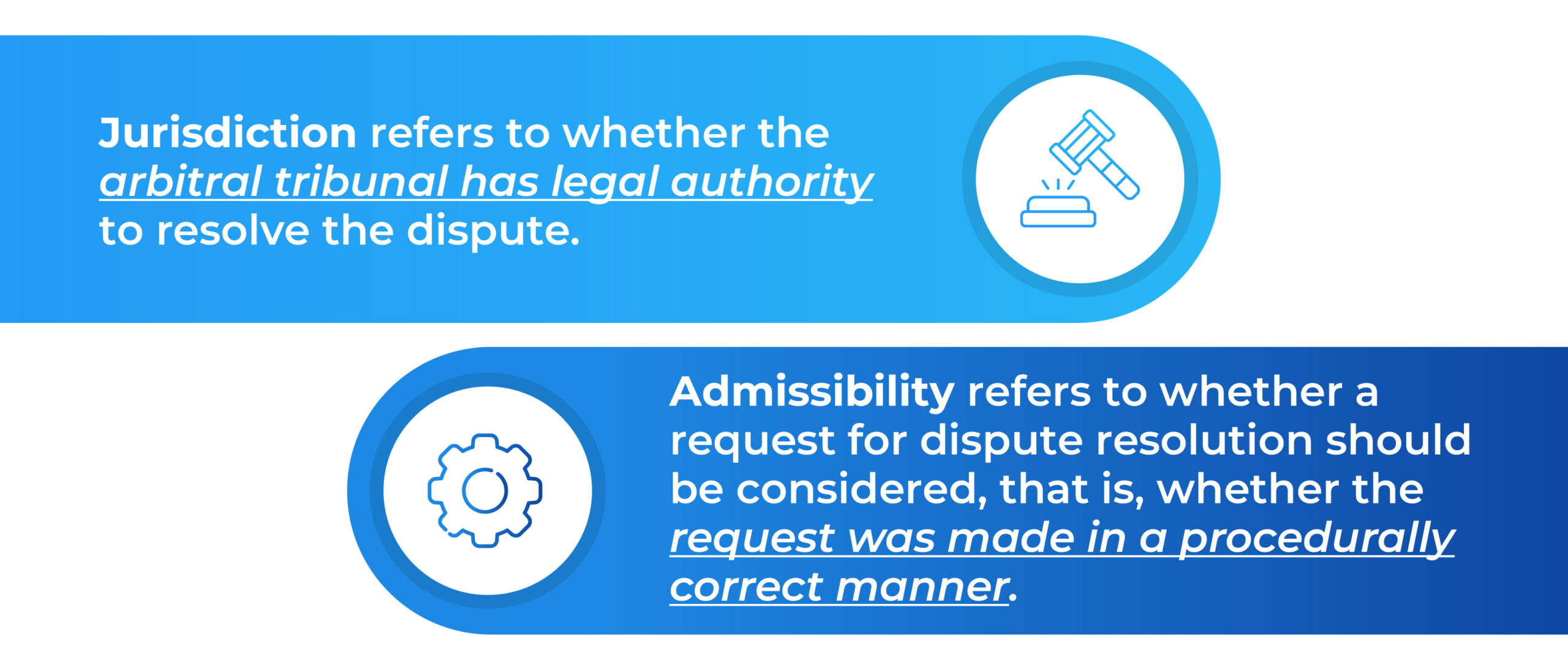
Distinguishing Jurisdiction and Admissibility
In Decision No. 526/2013/KDTM-QĐ (May 15, 2013), the Ho Chi Minh City People’s Court determined that the failure to conduct mediation before arbitration did not affect the validity of the arbitration agreement, considering the mediation procedure as independent of the arbitral tribunal’s jurisdiction.
Conversely, in Decision No. 10/2014/QĐ-PQTT (October 28, 2014), the Hanoi People’s Court annulled an arbitral award due to the parties’ failure to engage in prior negotiation, considering this a violation of the step-by-step dispute resolution process under Article 68.2(b) of the Law on Commercial Arbitration.
More recently, in Decision No. 02/2020/QĐ-PQTT dated April 23, 2020, the Hanoi People’s Court clarified that non-compliance with preconditions for initiating arbitration does not render the arbitration agreement invalid or unenforceable. This suggests that Vietnamese courts tend to treat such violations as issues of admissibility rather than jurisdiction.
In summary, court decisions in Vietnam remain inconsistent on this issue. Therefore, parties should be cautious when drafting arbitration clauses to mitigate future risks.
Issues Related to Objections to the Jurisdiction of the Arbitral Tribunal
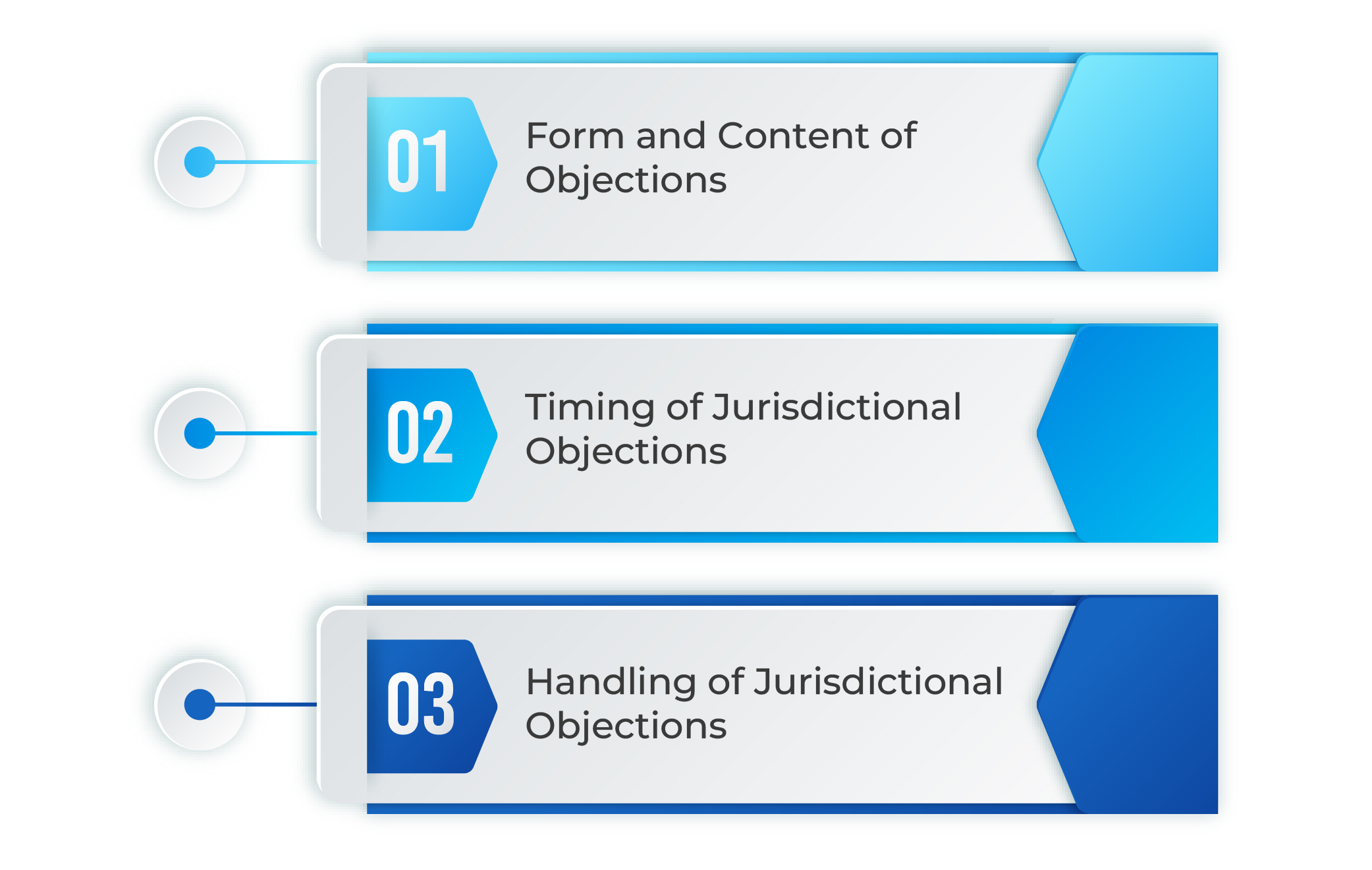
Considerations for Objecting to the Jurisdiction of the Arbitral Tribunal
First of all, regarding the form and content of an objection to the jurisdiction of the arbitral tribunal, the objection must be made in writing and submitted to the arbitral tribunal as well as the relevant parties in the dispute. The content of the objection should clearly state the legal grounds and provide specific evidence to justify the objection to the tribunal’s jurisdiction. This ensures that all parties have complete information and can present the necessary arguments during the dispute resolution process. Additionally, the 2010 Law on Commercial Arbitration explicitly stipulates that if the respondent in a dispute objects to the jurisdiction of the arbitral tribunal, this must be clearly stated in their Statement of Defense[11].
Regarding the timing of an objection to jurisdiction, the disputing party must raise the objection as soon as they identify a valid ground for doing so, within a specified timeframe[12]. If the law does not prescribe a specific timeframe, it will be determined based on the parties’ agreement or the procedural rules of the arbitration center. In cases where no such agreement exists and the arbitration rules do not provide a clear timeframe, the objection must be raised before the arbitral tribunal renders its final award[13].
If the parties fail to raise an objection within the specified timeframe, they will lose the right to object, as they will be deemed to have voluntarily waived this right[14]. It is crucial to raise objections to jurisdiction in a timely manner because failure to do so within the prescribed period may result in the objecting party being considered to have accepted the tribunal’s authority, thereby allowing the arbitral tribunal to proceed with resolving the dispute.
Regarding the handling of jurisdictional objections, the arbitral tribunal has the authority to independently assess and decide on its own jurisdiction under the principle of competence-competence. This means that the tribunal has the power to determine whether it has jurisdiction to resolve the dispute. Accordingly, before addressing the substance of the dispute, the tribunal must first examine its own jurisdiction[15] and issue a decision on this matter.
If the parties disagree with the tribunal’s decision on jurisdiction, they may raise an objection before the tribunal or the court within five working days[16]. At this stage, the court may intervene and issue the final decision on whether the arbitral tribunal has jurisdiction to resolve the dispute.
Legal Consequences of Objections to the Jurisdiction of the Arbitral Tribunal
Objections to the jurisdiction of the arbitral tribunal by the parties are optional.
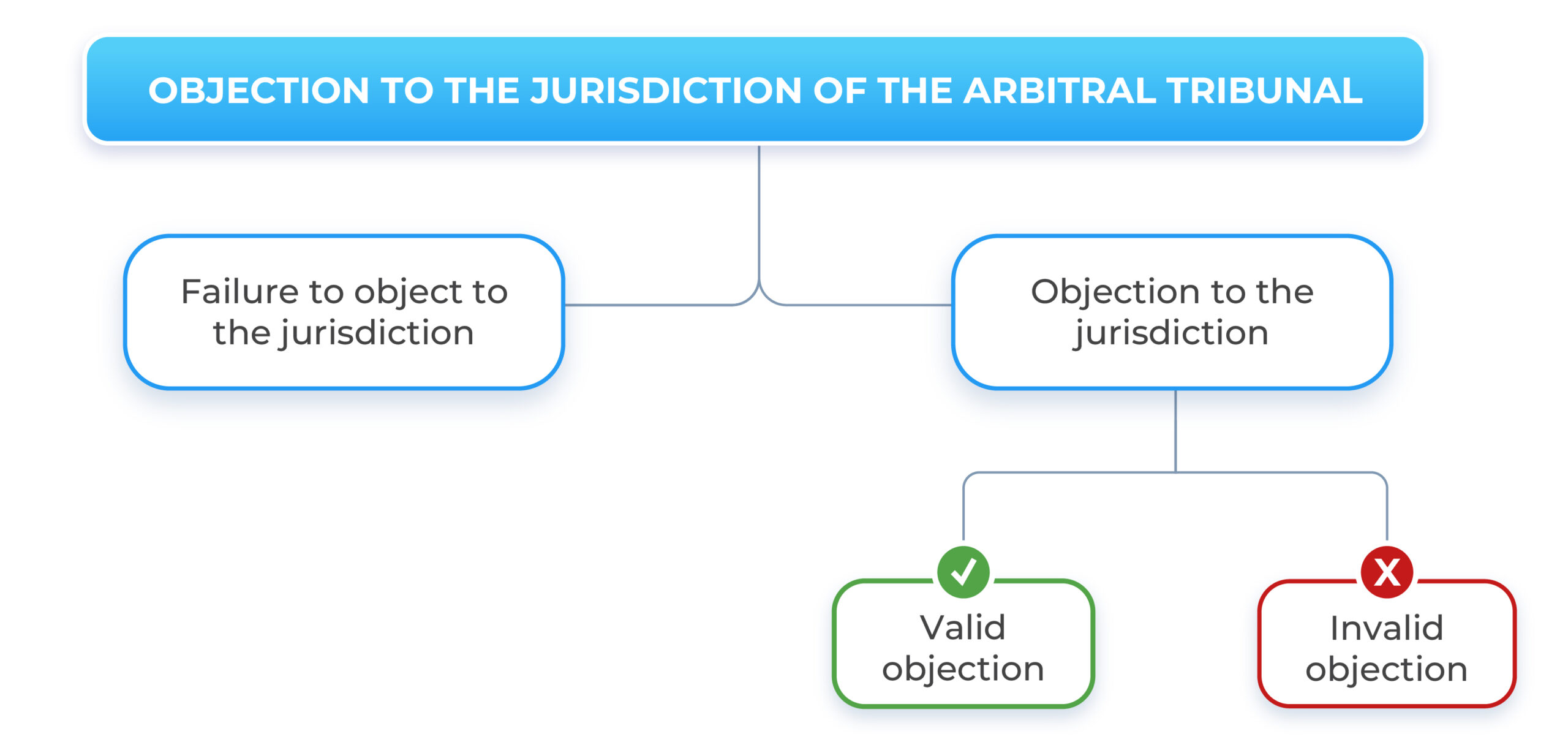
Failure to RaiseObjections to the Jurisdiction of the Arbitral Tribunal
If the parties fail to raise an objection to the jurisdiction of the arbitral tribunal, they will be deemed to have waived and lost this right[17]. In other words, if a party identifies a violation but does not timely object to the tribunal’s jurisdiction, it forfeits this right before both the arbitral tribunal and the court. Accordingly, if a party submits an objection to the tribunal’s jurisdiction after the prescribed timeframe, it will not be accepted or considered[18].
Moreover, parties involved in arbitration must be mindful of the risk of losing their right to object. If, during arbitration proceedings, a party discovers any irregularity concerning the tribunal’s jurisdiction, it must exercise its right to object immediately.
If a party becomes aware of a jurisdictional violation but still participates in the arbitration proceedings without raising any objection until the arbitral tribunal issues its final award, that party cannot later file a request with the court to annul the arbitral award on the grounds of jurisdictional violation.
This is because the right to object has been lost under Article 13 of the 2010 Law on Commercial Arbitration. Consequently, the parties no longer have the right to challenge the arbitral tribunal’s decision or request the annulment of the arbitral award based on jurisdictional violations for which they have waived their right to object[19].
Raising Objections to the Jurisdiction of the Arbitral Tribunal
If the parties raise an objection to the jurisdiction of the arbitral tribunal, the following scenarios may occur:
(i) The Arbitral Tribunal Accepts the Objection as Valid
If the objection is successful and the jurisdictional violation arises from the tribunal exceeding its scope of authority, the tribunal will continue to handle only the portion of the dispute that falls within its jurisdiction. The tribunal is not allowed to adjudicate the part that exceeds its jurisdiction unless the disputing parties expressly agree to extend the tribunal’s authority.
If the objection is successful in other cases, the tribunal must terminate the arbitration proceedings. As a result, the dispute will no longer fall under the tribunal’s jurisdiction, and the parties must determine how to proceed with resolving their dispute.
In such instances, the tribunal may only continue arbitration if the parties reach an agreement to do so. Otherwise, the parties may choose to file a lawsuit with the court for further resolution in accordance with the law[20]. This process ensures that the parties’ rights are safeguarded when the tribunal lacks jurisdiction while also guaranteeing that the dispute is resolved in the appropriate forum and under the correct legal procedures.
(ii) The Arbitral Tribunal Rejects the Objection
If the jurisdictional objection is unsuccessful, the arbitral tribunal will proceed with resolving the dispute, and the parties must accept its decision regarding jurisdiction. However, if the tribunal issues an arbitral award and one party still disagrees, believing that the tribunal lacked jurisdiction, that party may request the court to annul the award[21].
In such cases, the court may set aside the arbitral award if it finds that the tribunal exceeded its jurisdiction or did not have the authority to resolve the dispute[22]. This legal mechanism serves as an important safeguard to protect the parties’ rights and ensure that arbitral awards comply with the principles of lawful jurisdiction.
Conclusion
Challenging the jurisdiction of an arbitral tribunal is a crucial legal mechanism for protecting the legitimate rights and interests of disputing parties. Such objections must be raised in a timely manner, based on solid legal grounds, and in compliance with the applicable legal framework. This not only ensures fairness in dispute resolution but also enhances the transparency and effectiveness of arbitration in Vietnam.
A clear understanding of the arbitral tribunal’s jurisdiction is essential for parties to effectively safeguard their rights and interests. For further insights on this topic, CNC invites clients to explore related articles on The Establishment of an Arbitral Tribunal and The Jurisdiction of the Arbitral Tribunal.
Contact
To contribute or amend the content of this article or to request further support from CNC, please contact:
Address: 28 Mai Chi Tho, An Phu Ward, Thu Duc City, Ho Chi Minh City, Vietnam
Phone: (84) 28-6276 9900
Hotline: (84) 916 545 618
Email: contact@cnccounsel.com
Website: cnccounsel
Writen by
 |
Tran Pham Hoang Tung I Senior Associate
Phone: (84) 901 334 192 Email: tung.tran@cnccounsel.com |
 |
Nguyen Thi Hong Nhung I Collaborator
Phone: (84) 347 924 900 |
[1] Article 13 – Law on Commercial Arbitration and Article 6 – Resolution 01/2014/NQ-HĐTP.
[2] Article 4 – UNCITRAL Model Law on International Commercial Arbitration 1985.
[3] Tran Pham Hoang Tung, Pham Nguyen Tan Trung, ‘The Independence of the Arbitration Agreement’CNC Counsel <https://cnccounsel.com/tin-tuc/tinh-doc-lap-cua-thoa-thuan-trong-tai> accessed 12/12/2024.
[4] Article 16, Law on Commercial Arbitration 2010.
[5] International Commercial Arbitration, https://tracent.com.vn/thoa-thuan-trong-tai-thuong-mai-quoc-te/, accessed 12/12/2024.
[6] Nguyễn Thị Thu Trang, ‘Recognition and Enforcement of Foreign Arbitral Awards in Vietnam’ (13/10/2022) < https://dzungsrt.com/wp-content/uploads/2022/12/20221007_Recognition-and-Enforcement-of-Foreign-Arbitral-Awards-in-Vietnam_VN.pdf>
[7] Article 5, Law on Commercial Arbitration 2010.
[8] Article 18, Law on Commercial Arbitration 2010.
[9] Article 5, Law on Commercial Arbitration 2010.
[10] Logan Leung, Devathas Satianathan, ‘Breach of Preconditions to an Arbitration Agreement: A Matter of Jurisdiction or Admissibility?’, <Breach of Preconditions to an Arbitration Agreement: A Matter of Jurisdiction or Admissibility? – Arbitration Asia – Singapore>, accessed 26/02/2025.
[11] Article 35.4, Law on Commercial Arbitration 2010.
[12] Article 13, Law on Commercial Arbitration 2010.
[13] Article 6.1, Resolution 01/2014/NQ-HĐTP.
[14] Article 13, Law on Commercial Arbitration 2010.
[15] Article 43, Law on Commercial Arbitration 2010.
[16] Article 44, Law on Commercial Arbitration 2010.
[17] Article 13, Law on Commercial Arbitration 2010.
[18] Article 6.1, Resolution 01/2014/NQ-HĐTP.
[19] Article 6.2, Resolution 01/2014/NQ-HĐTP.
[20] Article 44.6, Law on Commercial Arbitration 2010.
[21] Article 69, Law on Commercial Arbitration 2010.
[22] Article 68, Law on Commercial Arbitration 2010.


